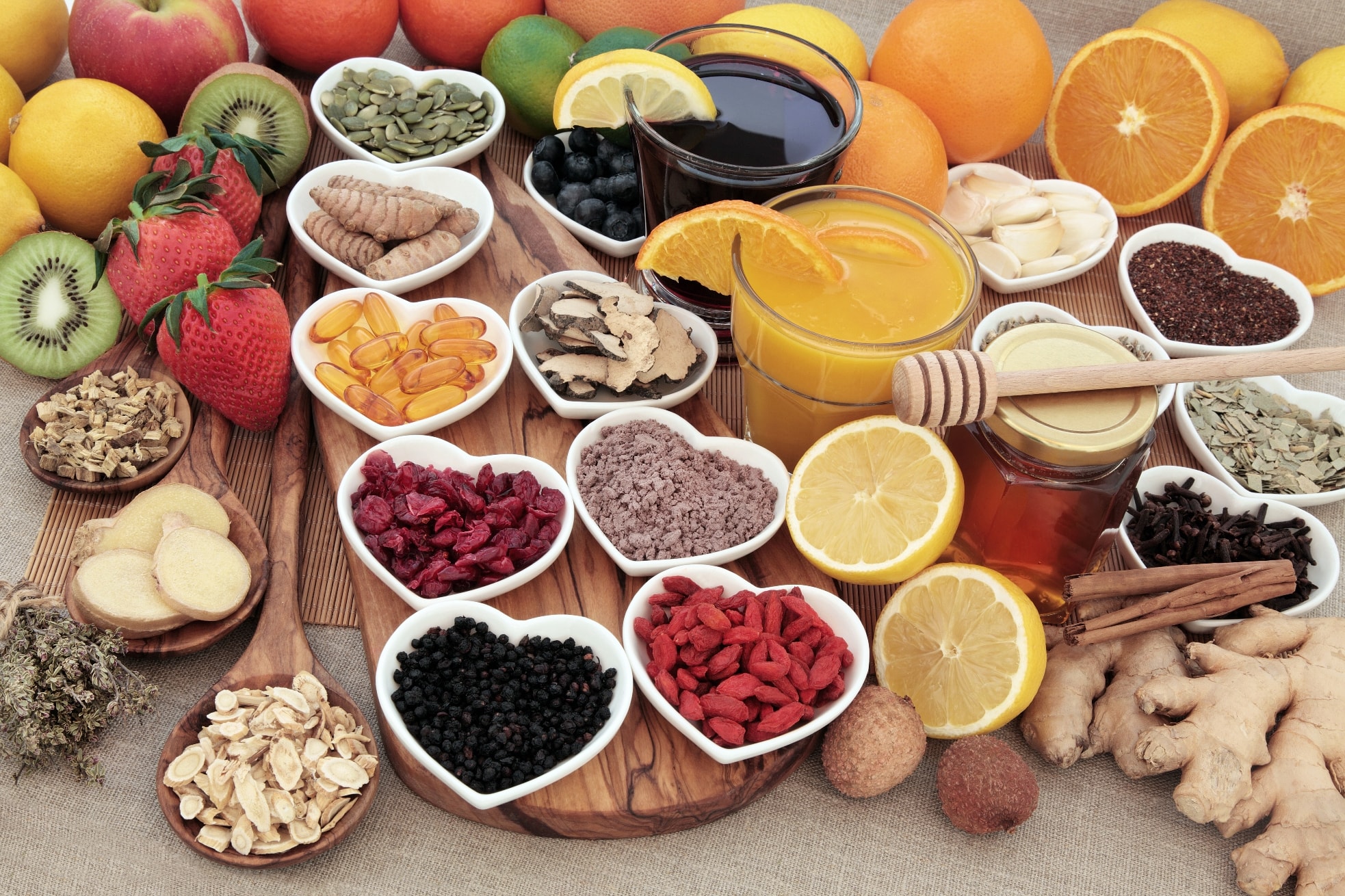If you are having a good and quality diet vitamins are usually not additionally required in the form of food supplements (FS).
But co-administration of vitamins is necessary if there is a higher physiological need after them, like is pregnancy, growth, certain disease conditions or if you have a medicinal drug therapy, where a normal absorption of vitamins might be compromised. It might be also necessary if you are in perimenopause or andropause.
The elevated needs for vitamins might also show up if you have a poor diet or are in circumstances like are increased efforts, stress or high physical activity.
When you decide to take a FS you should be sure about the quality of the product. It is advised that such product doesn’t contain preservatives, artificial colors, flavors and that it is properly packed and stored. Rather than the cheapest product, you should use the GMP certified product which has a certified quality, or is produced from renowned manufacturers that have safety and some (pre)clinical testing. You should have in mind that some dietetic products lack such kind of quality properties and that grocery stores do not offer professional advices on this topic.
Vitamins are absorbed from the small intestine. They are divided into two classes, depending on how they are dissolved. Those dissolved in the water are all B-complex vitamins (also vitamin H) and vitamin C; those dissolved in fat are vitamins A, D, E and K.
Below is the table of the most important vitamins, however not all are mentioned here.
The table is more extensive, especially if you are in perimenopause or andropause. About those vitamins and minerals you will get more information throughout the HEALTHIA®food cocahing module.
| Vitamin | RDA (mg)* | Function | Deficiency symptoms | Source | |
|---|---|---|---|---|---|
| A (retinol) pro-vitamin is beta-karotene |  | 0,8 | needed for new cell growth, healthy skin, hair, and tissues, and vision in dim light | dovzetnost za okužbe, suha in raskava koža, krhki lasje in nohti | veal liver, butter, margarine, egg yolk, cheese spread, herring, oysters, sardines, whole milk, mackerel |
| B1 (tiamin) |  | 1,4 | needed for energy metabolism and a proper function of the nervous system | Beriberi; indications: heart and circulatory disorders, neurological disorders and mental changes; | yeast, peas, oranges, cornflakes, boiled potatoes, pork chop, whole-wheat pasta and bread, egg yolk, white bread |
| B2 (riboflavin) |  | 1,5 | needed for energy metabolism, for building tissue, helps in maintaining good vision. | dermatitis (skin inflamation), oral mucosa ulcer and cracks in the mouth corners | milk (3.2% fat), sea bass, lettuce, spinach, pork, whole wheat flour |
| B3 (niacin; nikotinic acid) |  | 14-15 | pellagra; dermatitis, confusion, dementia, fatigue | dermatitis (skin inflamation), oral mucosa ulcer and cracks in the mouth corners pellagra; dermatitis, confusion, dementia, fatigue | liver, poultry, beef, tuna, salmon, eggs, legumes, yeast, nuts, peas, peaches, avocados, figs, prunes and processed cereals slightly green leafy vegetables, milk. |
| B5 (pantothenic acid) |  | 6 | needed for energy metabolism | fatigue, sleep disorders, indigestion, trembling hands and muscle cramps, restless leg syndrome | veal liver, peanuts, sesame seeds, walnuts, avocado, apples, dry apricots, dry figs; |
| B6 (piridoksin) |  | 2 | needed for cell growth | Anemia, brain abnormalities, epileptic seizures, depression, confusion and dermatitis. | wheat germ, wheat bran, beef liver, cod, turkey, beef, bananas, Brussels sprouts, cabbage, mango |
| B11 (folic acid) |  | 0,2 | promotes normal digestion; essential for development of red blood cells | anemia, increased chance of miscarriage and the development of some of the body abnormalities (backbone slots) | beef liver, cereals, brussels sprouts, peanuts, spinach, broccoli, lettuce, chickpeas, avocado, wheat germ |
| B12 (kobalamin) |  | 0,002 | needed for building proteins in the body, red blood cells, and normal function of nervous tissue | anemia, nerve damage (tingling and numbness of the limbs) | sheep's liver, liver pate, pork, duck meat, pheasant meat, eggs, cod, beef, cereals, yeast |
| vitamin C (ascorbic acid) |  | 60 | an antioxidant vitamin, needed for the formation of collagen to hold cells together and for the healthy teeth, gums and blood vessels; improves iron absorption and promotes resistance to the infections | many fresh vegetables and fruits, such as broccoli, green and red peppers, collard greens, Brussels’ sprouts, cauliflower, lemon, cabbage, pineapples, strawberries, citrus fruits | papaya, gvajava, black currant, green peppers, broccoli, strawberries, kiwi, oranges, cabbage, cauliflower |
| D (kalciferol) |  | 0,025 | promotes absorption and use of calcium and phosphate for healthy bones and teeth | rickets in children, osteomalacia (bone softening) in adults; osteoporosis, cognitive dysfunction, worse immune system functioning... | fish oil, herring, mackerel, sardines, salmon, margarine, fresh tuna, eggs, cheddar cheese |
| vitamin E (tokoferol) |  | 10 | protects red blood cells and helps prevent destruction of vitamin A and C | red blood cells degradation and related anemia, poor reflexes, fatigue and poor | wheat germ oil, sunflower oil, sunflower seeds, almonds, pine nuts, avocado, cereals, spinach |
| vitamin B7 ali vitamin H (biotin) |  | 0,06 | needed for normal growth and development of the body. It is produced by bacteria present in our GI tract. Pregnant women and body builders need it more. | dermatitis (inflamed skin), fatigue, depression, muscle pain, hair loss | roasted peanuts, peanut butter, hazelnuts, almonds, pork kidney, egg yolks, beef liver, nuts, sesame seeds, cottage cheese |
| K (menadion) |  | 0,2 | necessary for normal blood clotting and synthesis of proteins found in plasma, bone, and kidneys | in poor nutrition, Crohn's disease, ulcerative colitis, celiac disease; liver disease, broad-spectrum antibiotics, antilipemics, acetysalicilic acid (Aspirin); mucous bleeding, bruises; | broccoli, Brussels’ sprout, kale, cabbage, yogurt, egg yolk, soybean oil, fish oil, seaweed, calf liver, chicken liver, potato puree, spinach, radish, red pepper, peaches, red wine |
* RDA: recommended daily allowance
Water and Salt: Most of the material absorbed from the cavity of the small intestine is water in which salt is dissolved. The salt and water come from the food and liquid we swallow and the juices secreted by the many digestive glands. In a healthy adult, more than a gallon of water containing over an ounce of salt is absorbed from the intestine every 24 hours.
There are few more minerals needed in your diet. You will get to know all about them and about their function in HEALTHIA®food coaching module, especially also, if you are in perimenopause or andropause.
| Mineral | RDA (mg) | source |
|---|---|---|
| Ca | 1000 | edam, cheddar cheese, sesame seeds, sardines in oil, tofu, dried figs, fruit yogurt, whole milk, cereals, green beans |
| Cr | brewer's yeast, meat, whole grain cereals, nuts, red kidney beans, mango, peas, peanuts | |
| Cu | 2 | veal liver, oysters, sardines in tomato sauce, sunflower seeds, crab, lobster, peanuts, mushrooms, whole wheat bread, dried plums |
| Fe | 12 | cereals with bran, bran, sesame seeds, roasted venison, sardines in tomato sauce, dried apricots, steak, crayfish, tuna in oil, roast lamb |
| Iodine | 0,075 | any seafoods; use iodised salt; |
| Mg | 350 | cocoa powder, sunflower seeds, pumpkin seeds, bran, mixed nuts, peanut butter, cereals, rye bread, popcorn, whole-grain bread |
| Mn | 1-1,5 | Sea mussels, nuts (hazelnuts, walnuts), pumpkin seeds, whole wheat bread, tofu (firm / raw), beans, bass, whole grains, black tea, spinach, strawberries; Function: coenzyme in many enzimatic reactions, protects against free radicals |
| Mo | 0,45 | Beans, legumes, almonds, soybeans, dairy; Needed for the function of enzymes; for the synthesis of amino acids and metabolism of certain compounds. |
| P | 900 | cheese, liver, shrimp, crab, Mediterranean mussels, lobster, salmon, beef steak, turkey, plain yogurt |
| Se | 0,06 | Brazilian nuts, a mixture of nuts and raisins, fresh tuna, shrimp, sunflower seeds, grilled sole, whole wheat bread, cashews, walnuts, white rice |
| Trace elements | usually, in the extracts of marine mineral complexes | |
| Vanadium | 0,02-0,025 | We consume it in enough with the daily balanced food. Fresh beans... Never consume it additionally without consulting your doctor. It might increase the effects of insulin. Function: for treating diabetes, low blood sugar, high cholesterol, heart disease, tuberculosis, syphilis, a form of anemia, cancer prevention, water retention, for improving athletic weight training; |




